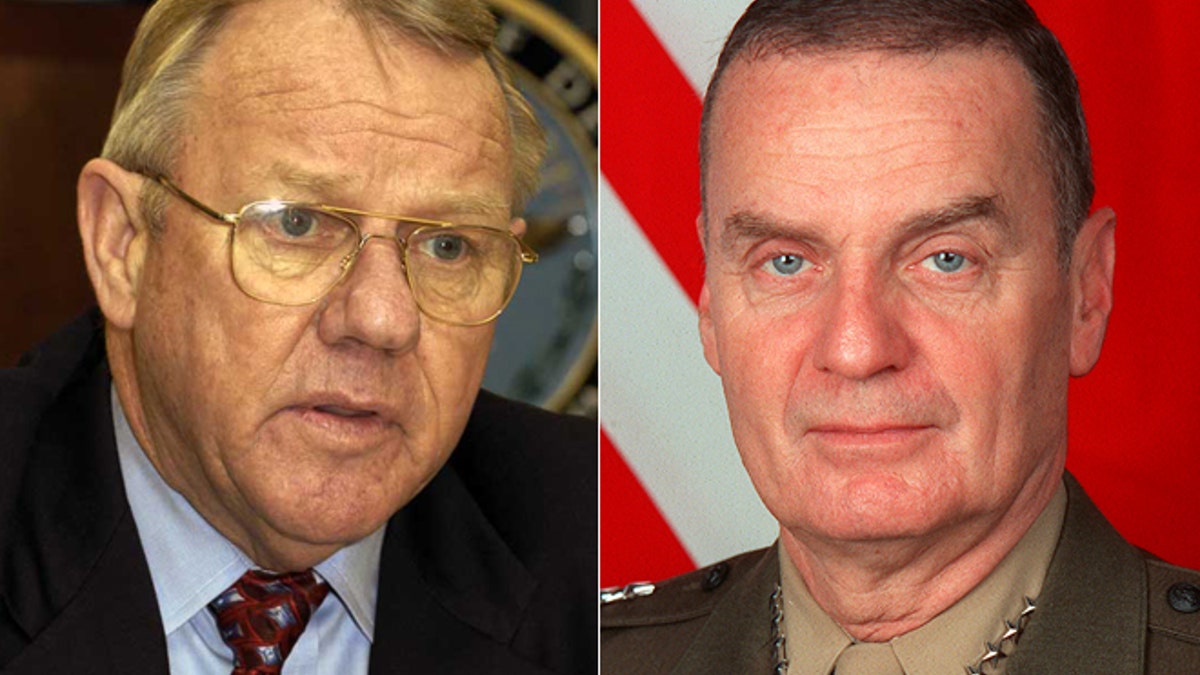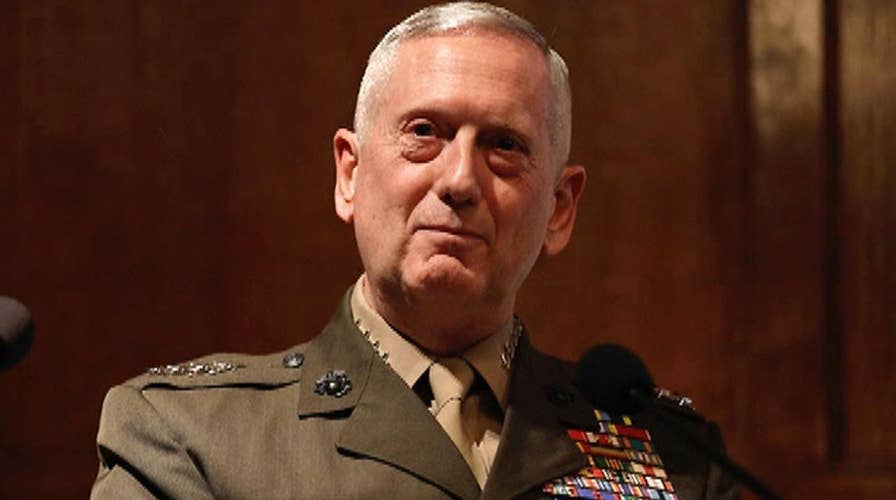Donald Trump's pick for Secretary of Defense
Is General Mattis a good choice? 'The O'Reilly Factor' investigates
Some of America’s top military brass – active and retired – are in Iraq to commemorate a mission carried out a quarter of a century ago, and one they believe could still be dusted off and duplicated to address the ongoing humanitarian crisis in Syria.
The cadre of four-star American generals arrived in Kurdistan, Iraq, Thursday, where they will meet with Kurdish President Mahmoud Barzani to mark the 25th Anniversary of Operation Provide Comfort, the 1991 mission that helped keep some 450,000 civilians out of the crossfire as the U.S.-led coalition battled Saddam Hussein’s forces. The operation established a “no-fly” zone in Northern Iraq, shielding the refugees from the brutal dictator’s airpower.
The general consensus was that what worked against Saddam could work against ISIS, the black-clad jihadist army that helped plunge Iraq and Syria into conflict and chaos.

Gen. Garner, (l.), and Gen. Jones, (r.), believe a no-fly zone would work again.
“I don’t have a crystal ball that could have predicted if a mission like this would have solved everything, but there is a refugee problem, after an attack on civilians,” retired U.S. Marine Corps Gen. James Jones told FoxNews.com. “If they didn’t examine it closely, they should have.”
Jones, who was National Security Adviser to President Obama during his first term, said a reprise of Operation Provide Comfort was pushed after Obama failed to follow through on warning Syria that using chemical weapons would be crossing a “red line.” Critics say the administration’s failure to back up its admonition emboldened Syrian President Bashar Assad, and worsened the humanitarian crisis as his forces battled rebels.
“You have a humanitarian catastrophe there,” Jones said. “At the time of the President’s red line failure to implement any kind of consequence for Assad to attack his own people with chemical weapons, we contacted authorities and reminded them that there was a template out there -- an operation like OPC could be conducted in Syria.”
Retired Army Lt. Gen. Jay Garner, who was commander of Operation Provide Comfort, said creating a no-fly zone in Syria is the kind of leadership only the U.S. can provide.
“It can still be done, but it will be far more complicated than it would have been early on,” Garner said. “There are still areas in Syria to create safe zone for these refugees.”
According to the United Nations Refugee Agency, about 3.2 million Syrian refugees have been uprooted from their homes in a civil war that has killed an estimated 500,000 since it began in March 2011. Getting the displaced civilians to a zone within their homeland that can be protected is a key first step to saving lives and stemming the flow of refugees into Turkey and ultimately Europe.
“I recommend we do all we can to keep refugees in their general geographic areas and give them the quality of life they need,” Garner said. “We can do an awful lot by order of magnitude and can also eliminate the possibility -- and actuality -- of ISIS and other terrorist groups embedding themselves within the refugee population if we create these safe zones.”
Garner acknowledged obstacles to replicating the operation, including the complex nature of the multi-faceted war in Syria, where national forces, rebels, ethnic Kurds, ISIS, Al Qaeda, Russia, Iran, the U.S., Turkey and other multi-national armies are all embroiled in everything from open warfare to uneasy alliances.
“If you ally with the Syrian Rebels, you’re taking on the Russians and the Kurds; if you ally yourself with Assad, you’re in a Shia alliance and 85 percent of the Middle East is Sunni,” Garner said. “If Russia eliminates ISIS, they eliminate the Syrian rebels and the Syrian rebels should be our allies -- we need to protect them, and we need to continue to protect the Kurds.”
Former Commandant of the Royal Netherlands Marine Corps Gen. Egbert Klop, who was part of the original mission and joined his American counterparts this week, said Operation Provide Comfort worked because it was carried out by a coalition of the “able and willing” with the United States in charge.
“Without the fast and extensive logistical support of the U.S. military, there couldn’t have been an operation like this in the first place,” Klop told FoxNews.com. “I am absolutely convinced that from a military point of view, such an operation could be carried out again in Syria, if the Great Powers would have enough political will to do so -- it would prevent a lot of humanitarian suffering.”
This week in Kurdistan, the military leaders will meet with Barzani and members of his cabinet to celebrate the mission and discuss how another generation of civilians can be saved from the ravages of war.
“The main thing is to gain control of the refugees and get rid of ISIS and once you do that, you get to imagine what post-war Syria will look like,” Garner said. “Nothing is ever easy, but hell, we’re Americans -- we can do anything.”


